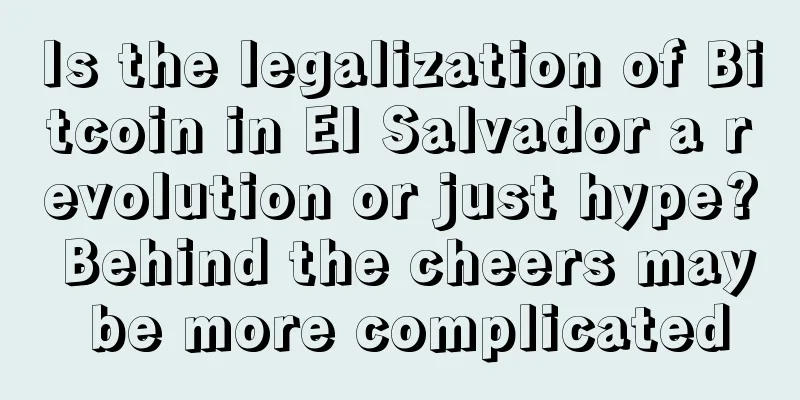Is the legalization of Bitcoin in El Salvador a revolution or just hype? Behind the cheers may be more complicated

|
On June 9, the El Salvadorian parliament passed a resolution to officially approve Bitcoin as the country's legal tender. The Central American country of El Salvador became the first country in the world to recognize Bitcoin as legal tender. At the same time, the government will launch a Bitcoin wallet for citizens and officially operate a trust fund holding $150 million in Bitcoin to offset Bitcoin volatility, thereby ensuring that merchants do not have to bear risks. This day is also called "the most important day in the history of Bitcoin" by the Chinese crypto community. On this day, Bitcoin was used as legal tender by a country for the first time in history, and its role was "on par" with the current legal tender, the US dollar. El Salvador does not have its own currency El Salvador does not have its own currency; the U.S. dollar is the local currency. Before 2000, El Salvador had its own currency, the Krona. However, due to severe inflation, the currency system of El Salvador collapsed and it has had to use the U.S. dollar for circulation ever since. Means of improving financial inclusion El Salvador, located in northern Central America, is a country dominated by cash transactions. Almost 98% of remittances are made through traditional channels, and even 70% of residents do not have bank accounts. In addition, about a quarter of El Salvador's citizens live in the United States, making remittances a major source of income for the country. According to official reports, in 2020, remittances from overseas workers to their hometowns totaled $5.9 billion, accounting for about 22% of the country's GDP. However, for these international transfers, existing services charge fees of 10% or more, and transfers can sometimes take days to arrive, and sometimes require in-person receipt. Salvadoran President Bukele pointed out that the use of Bitcoin can avoid "millions of dollars in losses" during remittances and can increase the amount of money received by more than 1 million low-income families each year by billions of dollars. The bill that lists Bitcoin as legal tender in El Salvador stipulates that the exchange rate of Bitcoin to US dollars in El Salvador follows the exchange rate in the global market. The Salvadoran government hopes to promote foreign investment, enhance the inclusiveness of the financial industry, and create jobs through this measure. "This will improve the lives and futures of millions of people," Bukele promised. The basic rules of the Bitcoin Act are published 1. The purpose of this law is to regulate Bitcoin as legal tender, without restrictions on free power. 2. The exchange rate between Bitcoin and the U.S. dollar will be freely determined by the market. 3: All prices can be expressed in Bitcoin. 4: All tax contributions can be paid in Bitcoin. 5: Bitcoin transactions will not be subject to capital gains tax like any fiat currency. 6: For accounting purposes, the U.S. dollar will be used as the reference currency. 8: Every economic entity must accept Bitcoin as a method of payment. Whoever obtains goods or services must accept Bitcoin. 14: Until this Law comes into force, the State will guarantee, through the creation of a Trust Fund at the El Salvador Development Bank (BANDESAL), the automatic and instant convertibility of Bitcoins for the State-provided alternatives mentioned in Article 8. 15: This law is specific in its application and any provisions that conflict with it are repealed as compared to other laws regulating the matter. 16: This decree shall enter into force ninety days after its publication in the Official Gazette. A young president who capitalizes on trends Salvadoran populist and "Twitter President" Bukele's tweets in recent years have attracted much attention from the market. Born in 1981, Bukele is a maverick who does not follow the beaten path. He is a staunch supporter of former US President Trump's "rule of the country through Twitter." Bukele, who is only 38 years old, is very popular in China. Gray, an expert on the Global Initiative for Digital Currency, called him a "young president who will take advantage of the current trend." Gray said that even if Bukele may not have "figured out" all the details, announcing such a thing has great public relations value. However, some people believe that El Salvador's approach may just be a gimmick, and the endorsement of such a small country cannot change the high risk of Bitcoin. Gray similarly warned that when a country adopts cryptocurrency as legal tender, it would be handing over considerable control to “an unstable network” with no responsible actors and no record of “price stability and liquidity” that regular currencies can offer. But it’s worth noting that Bukele’s embrace of Bitcoin has made him a crypto icon overnight and significantly increased global attention on El Salvador. Behind the scenes, is there any benefit in legalizing Bitcoin? Initially, Salvadoran President Bukele announced a partnership between El Salvador and digital currency wallet company Strike to build the country’s modern financial infrastructure using Bitcoin technology. After that, Stirke launched a mobile payment app in El Salvador, which quickly climbed to the top of the downloads list after its release. Before the legislation, Jack, the founder of Bitcoin Lightning Network wallet Zap, said at the Bitcoin 2021 conference in Miami that El Salvador is drafting a bill to recognize the legal status of Bitcoin, and his wallet company is working with the Salvadoran populist party to implement the plan. Although the bill must still be reviewed by the National Legislative Assembly, the approval of the bill is almost a foregone conclusion as the new populist party firmly controls the institution. Before the legislation, President Bukele changed his Twitter profile picture to his iconic "laser eyes". Before the legislation, President Bukele retweeted Tron founder Sun Chenyu's tweet that "crypto investors and entrepreneurs will begin to move to El Salvador," and mentioned the four major benefits of El Salvador for cryptocurrency entrepreneurs: 1. Suitable climate, world-class surfing beaches, and seaside agency business 2. One of the few countries in the world without property taxes 3. No capital gains tax on Bitcoin 4. Instant permanent residency for crypto entrepreneurs. Prior to the legislation, President Bukele congratulated TRON on opening an office in El Salvador. On June 9, President Bukele submitted a Bitcoin legislation proposal to the National Congress of El Salvador, and said that there is almost a 100% chance that the bill to make Bitcoin a legal currency will be passed. On June 9, the bill for Bitcoin to become legal tender was approved by the parliament, and "Parliament approves Bitcoin law" was written into Bitcoin block No. 686938. After the legislation, President Bukele tweeted that he had instructed the president of the state-owned geothermal power company of El Salvador to develop a plan to provide very cheap, 100% clean, 100% renewable, zero-emission volcanic energy for Bitcoin mining. F2Pool co-founder Shenyu posted on Weibo that when he investigated hydropower in 2014-2015, he learned that geothermal power generation costs are very low and has a high degree of stability. The main cost is the cost of digging geothermal wells, and volcanic areas are particularly suitable. After that, Bukele posted again, sharing the Bitcoin mining plan under construction. After the legislation, Google searches for the term "El Salvador real estate" spiked. After the legislation, global searches for the keyword "El Salvador" hit a record high for the year. After the legislation, data showed that about 20,000 Salvadoran residents used Bitcoin to conduct transactions through the Lightning Network in one week, paying a total of 13,879 Sats (equivalent to less than $5). Following the legislation, a large number of Bitcoin ATMs are being shipped to El Salvador. Following the legislation, Bitcoin ATM provider Chainbytes is building a Bitcoin ATM manufacturing center in El Salvador. According to the company, it plans to make El Salvador the Bitcoin ATM manufacturing center for the entire Americas. On June 24, President Bukele tweeted again, expressing his belief that the legalization of Bitcoin will be successful. After Bitcoin was legalized in the country, it did promote employment opportunities and economic development in the country, reduced El Salvador's dependence on the existing legal currency, the US dollar, and also reduced a considerable amount of expenses for remittances from Salvadorans living abroad. However, after El Salvador legalized Bitcoin, many well-known economists, institutions, and scholars in the world also expressed their opposition to El Salvador. By adopting Bitcoin as legal tender, the Salvadoran government "went to the casinos to gamble with Salvadoran money," Ricardo Castaneda, an economist at the Central American Fiscal Institute, said in a television interview. "There is a very strong improvisational element here. The government has bet the resources of the Salvadorans in the casinos," at the cost of very high uncertainty and economic instability, which will only create more problems for an economy that has been severely weakened by the pandemic. The Wall Street Journal published an article titled “Bitcoin Law, El Salvador’s Big Mistake” about the grave mistake El Salvador made by mandating Bitcoin as legal tender, written by renowned monetary economics professor Steve Hanke and Salvadoran economist Manuel Hinds. Major U.S. commercial bank JPMorgan Chase noted in a recent report that it is “difficult” to see any “tangible economic benefits” from the adoption of Bitcoin, and that El Salvador’s absolute adoption of Bitcoin as its second form of legal tender could jeopardize its negotiations with the International Monetary Fund (IMF). Worse still, the event could affect the way the larger economy treats Bitcoin. The International Monetary Fund (IMF) said that El Salvador’s adoption of Bitcoin as legal tender raises a number of macroeconomic, financial and legal issues. Opposition voices in El Salvador After El Salvador legalized Bitcoin, the Nationalist Republican Alliance (ARENA) was the first to stand up and express opposition and will file a lawsuit against the rules of the Bitcoin legalization proposal. "It is a law that is totally against the interest of the people, a law that only by its announcement of approval will make the basic food basket of all Salvadorans more expensive, it will make electricity more expensive, it is a law that encourages financial organizations of international organizations not to lend to El Salvador, it will scare away foreign investments and it is a law that 90% of citizens reject," said René Portillo Cuadra, a congressman from ARENA. He said that he hopes the rest of the legislative parts will be presented together with the proposal to repeal the law, because people reject that they have their salaries paid in Bitcoin, that the remittances they receive from relatives abroad are converted into this virtual currency and that pensions will also have to be paid in cryptocurrency before the use of Bictoin as the national currency is legalized. Most companies in El Salvador have said they will not use Bitcoin because of its "volatility" and oppose the Bitcoin bill's requirement that companies use Bitcoin. The deep thinking behind the Bitcoin Act I browsed the website of the Salvadoran government, and found many policy announcements about increasing the budget for infrastructure investment, such as providing computers to all children for free, free vaccinations, and raising wages for certain types of jobs, thereby plundering the private economy. I prefer to explain this policy of the Salvadoran government using Keynesianism (advocating that the country adopt expansionary economic policies to promote economic growth by increasing demand, that is, expanding government spending, implementing fiscal deficits, stimulating the economy, and maintaining prosperity), but it is not sound after all. On the one hand, it is not difficult to see that legalizing Bitcoin is simply a continuation of this policy: it would enable the government to obtain additional funds for spending through a new Bitcoin fund. But on the other hand, El Salvador has already cooperated with many crypto companies (Zap, Strike, etc.) as early as March of this year, and the author believes that there will be more centralized institutions behind this. Some of these institutions are also providing intermediary services such as transfer and exchange of US dollars to domestic users in El Salvador. Therefore, the interest relationship behind the legalization of Bitcoin may be far more complicated than the cheers of the crypto community. Summarize Of course, as a person in the cryptocurrency circle, one must have the soul of the cryptocurrency circle. Finally, the author wishes El Salvador to move towards a more prosperous path, so that the people who have suffered for a long time in the country can enjoy better treatment. I also wish Bitcoin to go further and further on the road to globalization. |
>>: Are these institutions still buying Bitcoin after the “619” crypto market’s deep correction?
Recommend
Domestic mining industry encounters “9.4”, how can miners save themselves?
On June 1, 2021, TopIPFS co-founder Khan of Minin...
Alchemy Pay will cooperate with Mastercard to launch a virtual cryptocurrency card that will support more than 40 cryptocurrencies including Bitcoin
According to Alchemy's announcement, it will ...
People with moles on their upper lips will have no worries about food and clothing in their lives. They have good luck.
In fact, many people have some moles on their fac...
What are the characteristics of a person with good luck? A broad forehead
Face has a great influence on us. Everyone's ...
Is it good for a woman to have a mole on her right ring finger? Mole physiognomy analysis
Everyone has moles on their body to a greater or ...
What kind of people can help your career the most?
What kind of people can help your career the most...
How is the fortune of women with beauty moles? The fortunes vary depending on the location of the mole.
As the saying goes, heroes have always been tempt...
5 Most Profitable Nose Shapes
The nose is located in the middle of our face. Ge...
A girl has a mole under her left breast. What does it mean for a woman to have a mole under her breast?
Is it good for a woman to have a mole under her b...
Bitcoin breaks through 100,000 yuan, can you still buy it?
According to historical data, there were only 17 ...
Echo prepares to launch blockchain decentralized chat software
Rage Review : Peer-to-peer messaging and digital ...
The marriage line on your palm shows whether you are destined to marry into a wealthy family
Although Fan Bingbing said: I won’t marry into a ...
What is the meaning of vertical lines on the bridge of nose? What is the meaning of vertical lines on the bridge of nose?
Everyone has lines on their body, such as nasolab...
What kind of face is unlucky?
There are many things in life that are not satisf...
Technical analysis of the OpenEthereum client error after the Berlin upgrade
Original title: "Popular Science | The whole...









